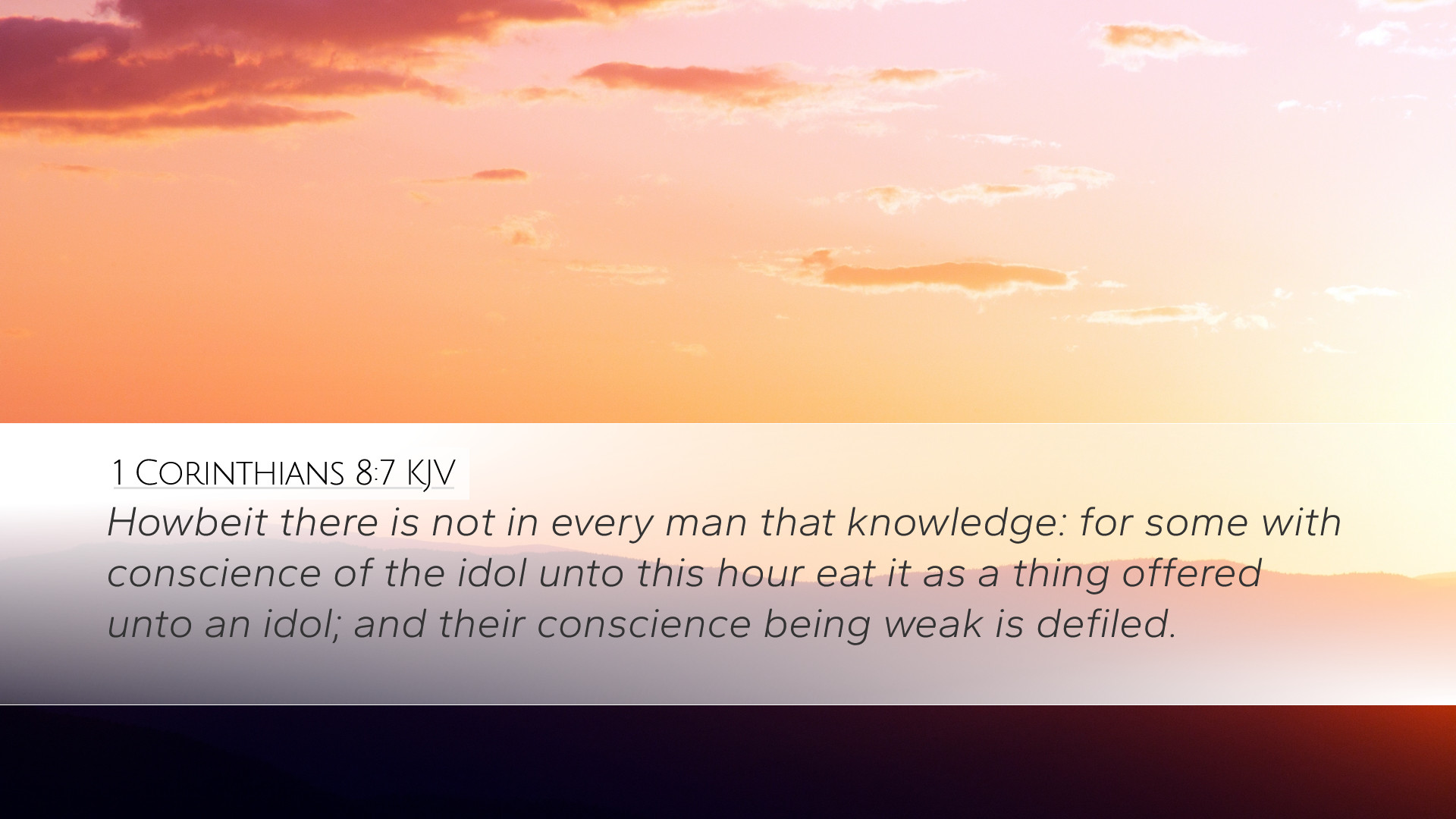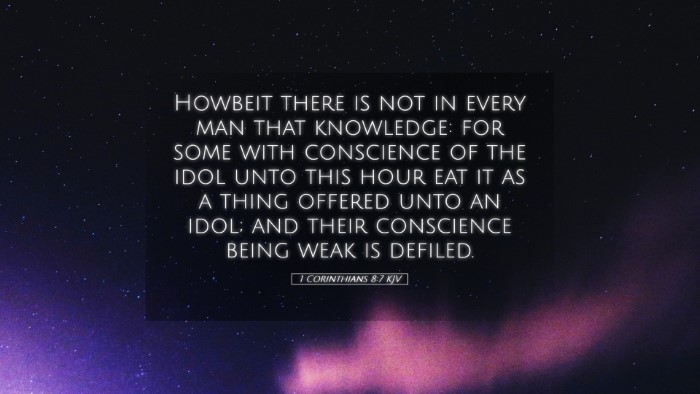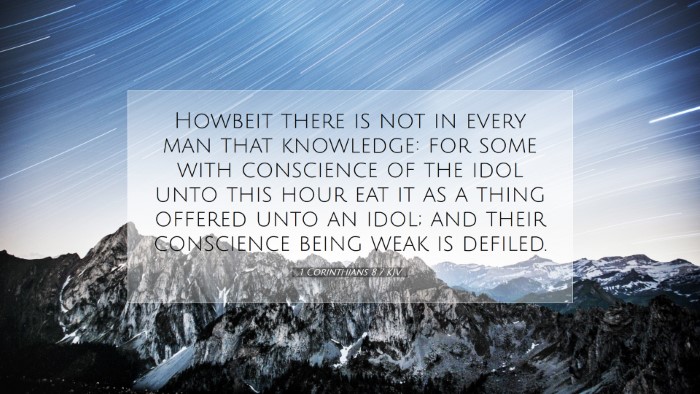Old Testament
Genesis Exodus Leviticus Numbers Deuteronomy Joshua Judges Ruth 1 Samuel 2 Samuel 1 Kings 2 Kings 1 Chronicles 2 Chronicles Ezra Nehemiah Esther Job Psalms Proverbs Ecclesiastes Song of Solomon Isaiah Jeremiah Lamentations Ezekiel Daniel Hosea Joel Amos Obadiah Jonah Micah Nahum Habakkuk Zephaniah Haggai Zechariah Malachi1 Corinthians 8:7
1 Corinthians 8:7 KJV
Howbeit there is not in every man that knowledge: for some with conscience of the idol unto this hour eat it as a thing offered unto an idol; and their conscience being weak is defiled.
1 Corinthians 8:7 Bible Commentary
Commentary on 1 Corinthians 8:7
Text of the Verse: "Howbeit there is not in every man that knowledge: for some with conscience of the idol unto this hour eat it as a thing offered unto an idol; and their conscience being weak is defiled."
Introduction
The Apostle Paul's discussion on knowledge and conscience in 1 Corinthians 8:7 is pivotal in understanding the ethical implications of Christian liberty in light of idolatry. This verse draws attention to the diverse spiritual maturity within the Christian community and the importance of love and sensitivity to weaker believers. The insights from public domain commentaries illuminate various dimensions of this significant scripture.
Insights from Matthew Henry
Matthew Henry emphasizes the reality that not all believers possess the same understanding of spiritual matters, particularly concerning the sacrificial practices related to idols. He notes:
- Knowledge and Conscience: Henry argues that while some believers possess a strong knowledge of the truth—understanding that idols are nothing—they may neglect the consideration of their fellow believers whose consciences are still bound by the traditions they were raised in.
- Weak Conscience: He highlights how believers with a weak conscience can be led into sin by others who do not exercise caution in their liberty. This admonition serves to remind the strong that their freedom should not cause the weak to stumble.
- Defilement of Conscience: The act of eating food offered to idols, under the wrong circumstances, can lead to the defilement of a weak brother’s conscience, which Paul addresses throughout the chapter. Henry stresses the need for care in how one's actions impact others spiritually.
Insights from Albert Barnes
Albert Barnes expands on the implications of having differing levels of knowledge and its impact on the Christian community:
- The Nature of Knowledge: Barnes notes that knowledge is not universally possessed among believers; some remain in ignorance or struggle with the implications of their past idol-worship, which can lead them to participate in idolatrous practices in their minds, even when they engage in the act of eating.
- Responsibility to the Weak: Barnes echoes the sentiment that the mature in faith have a responsibility to guide and protect those who are weak in faith. He indicates that stronger believers must be cautious with how their actions may affect others. The emphasis is on moral responsibility and communal well-being rather than self-indulgence.
- Conscience and Its Effects: He suggests that when the weak are encouraged to act against their conscience, they harm their spiritual lives, leading them away from faith. The fragility of the conscience in this context cannot be overlooked, as it is vital to nurture and respect those who are still on their journey to spiritual maturity.
Insights from Adam Clarke
Adam Clarke provides an in-depth exploration of the theological and practical ramifications of the passage:
- Theological Understanding of Idolatry: Clarke explains the theological background surrounding idolatry, emphasizing that while believers understand the nothingness of idols, the implications for those who do not share this understanding are significant. His commentary speaks to the role of your understanding in communal worship and interactions.
- Social Responsibility: Clarke delves into the social dynamics at play, emphasizing the importance of community over individual liberty. He points out that true knowledge leads to love and humility, which ought to guide a believer’s decision-making processes.
- Illustration of the Weaker Brother: Clarke illustrates how the actions of the stronger members of the faith community can either strengthen or weaken those who are less knowledgeable. He reiterates that using one's liberty injudiciously risks leading weaker believers into spiritual doubt and conflict.
Practical Application for Pastors and Theologians
The insights garnered from 1 Corinthians 8:7 compel pastors and theologians to consider practical applications in their ministries:
- Teaching Sensitivity: It is crucial to teach congregations about the differing levels of spiritual maturity and to foster an environment of understanding. Training leaders to be sensitive towards weaker believers in worship practices, especially regarding controversial subjects like food, is vital.
- Community Engagement: Encouraging believers to engage with one another—especially through mentorship—reinforces a culture of love and mutual edification. Strong believers must use their knowledge to uplift those struggling with their faith.
- Modeling Christ-like Compassion: The body of Christ must model the compassion of Jesus, prioritizing the spiritual welfare of others over personal freedoms. Leaders need to embody this principle in their decision-making processes.
Conclusion
1 Corinthians 8:7 provides rich theological insights into the dynamics of knowledge, conscience, and community within the body of Christ. The commentaries by Matthew Henry, Albert Barnes, and Adam Clarke collectively advocate for love and responsibility among believers. The teaching from this verse calls for an enduring commitment to the well-being of all within the community, particularly those who are less mature in faith. The strength of the Christian community lies not solely in individual knowledge but in its collective love and concern for one another.


